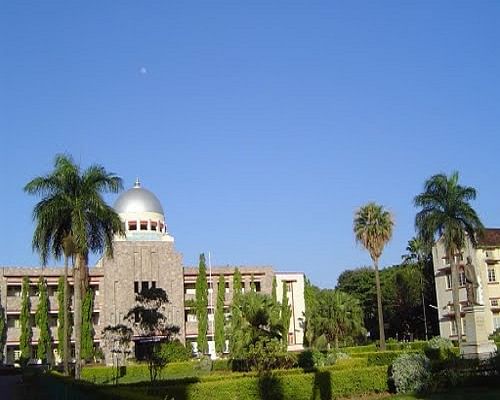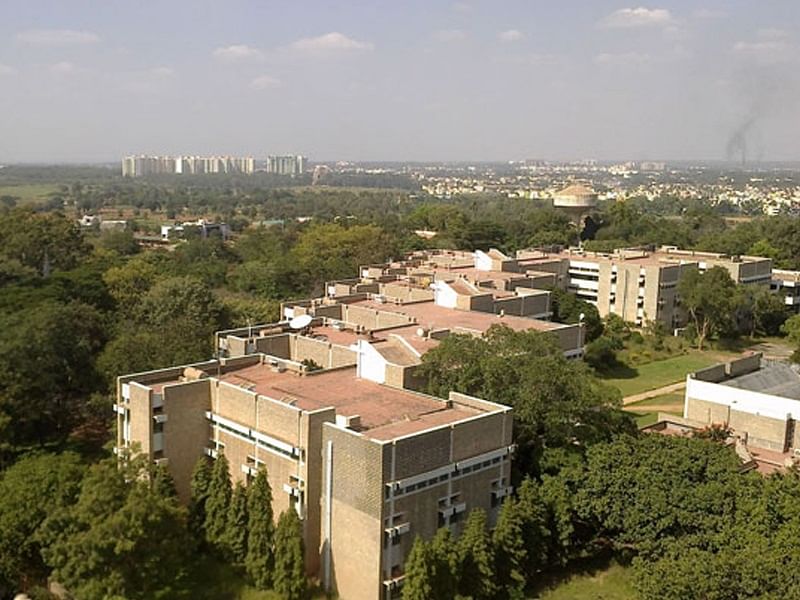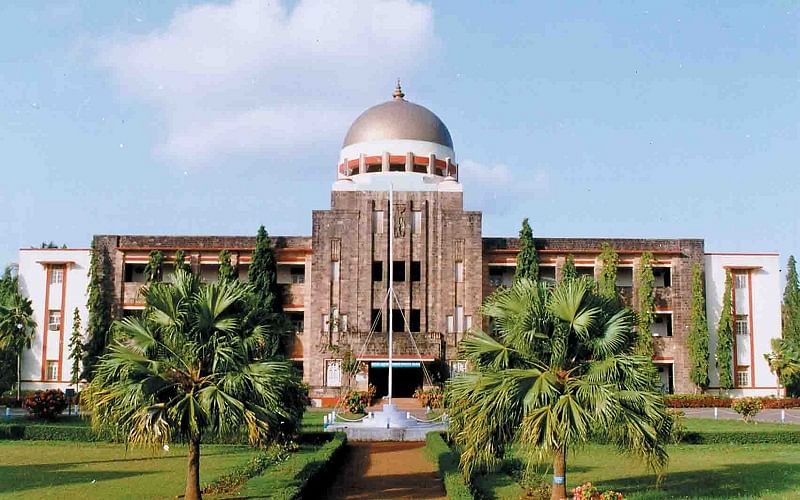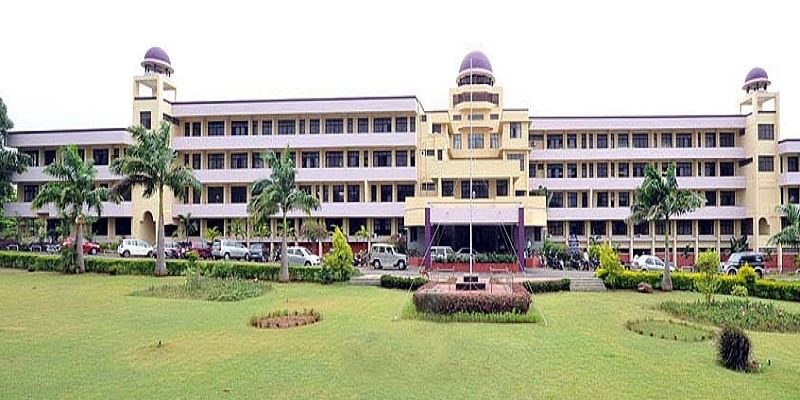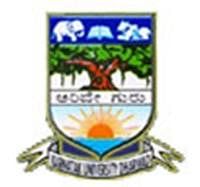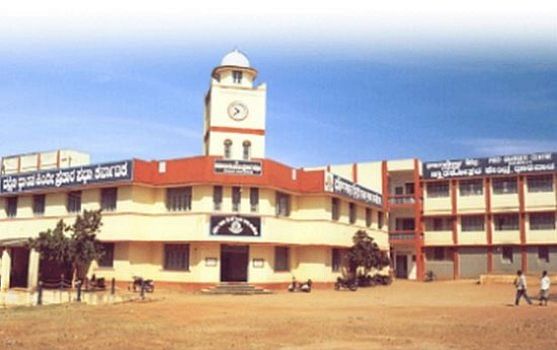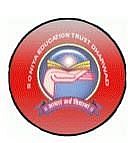
University of Agricultural Sciences, Dharwad: Courses, Fees, Facilities 2026
- Dharwad , Karnataka
- (6 Reviews)
- 4.1 (6 Reviews)
Latest Update for University of Agricultural Sciences, Dharwad
-
2025-04-22
The final list of students who will be awarded Gold Medals and Cash Prizes during the 38th Convocation has been released.
-
2025-04-22
The final list of students who will be awarded Gold Medals and Cash Prizes during the 38th Convocation has been released.
The University of Agricultural Sciences, Dharwad, was founded on October 1, 1986. It encompasses 5 colleges, 27 research stations, 6 agricultural extension education centers, 6 Krishi Vigyan Kendras, and an Agricultural Technology Information Center (ATIC). The university serves a vast jurisdiction covering seven districts in northern Karnataka: Bagalkot, Belgaum, Bijapur, Dharwad, Gadag, Haveri, and Uttar Kannada. This region is characterized by diverse soil types, climates, topographies, and farming conditions, ranging from dry-farming areas to regions with heavy rainfall and irrigation. Major crops cultivated include sorghum, cotton, rice, pulses, chilies, sugarcane, groundnut, sunflower, wheat, and safflower, alongside a wide variety of horticultural crops. Significant advancements have been made in education, research, and extension activities through the university’s efforts.
UAS Dharwad Highlights
UAS Dharwad focuses on education, research, and extension activities to meet the agricultural needs of Karnataka, offering a variety of degree and diploma courses, while also supporting students with essential campus infrastructure like sports and hostel facilities
| Key Highlight | Details |
|---|---|
| Established | 01-Oct-86 |
| Colleges | 5 Colleges: Agriculture, Forestry, Community Science, Agricultural Marketing & Cooperation, and Food Technology |
| Research Facilities | 27 Research Stations, 6 Agriculture Extension Education Centers, and 6 Krishi Vigyan Kendras (KVKs) |
| Jurisdiction | 7 districts in Northern Karnataka (Bagalkot, Belgaum, Bijapur, Dharwad, Gadag, Haveri, Uttar Kannada) |
| Specialty Crops | Sorghum, cotton, rice, pulses, sugarcane, groundnut, sunflower, wheat, safflower, and horticultural crops |
| Sports Facilities | A dedicated Sports Arena with various indoor and outdoor sports facilities |
| Student Strength | Over 1000 undergraduate and postgraduate students across disciplines |
| Hostels | Multiple hostels for boys and girls across campuses |
| Research and Extension | Focus on sustainable agriculture and development of farming practices suitable for the region's varied climatic conditions |
UAS Dharwad Ranking and Awards
UAS Dharwad is ranked 28th in the Agriculture category by the National Institutional Ranking Framework (NIRF) 2023. This ranking reflects the university's strong academic and research programs in the field of agriculture and allied sectors
| Category | Ranking |
|---|---|
| Agriculture and Allied Sectors | 28th |
UAS Dharwad Constituent Colleges
| Course | Fees | Eligibility |
|---|---|---|
| B.Sc | ₹18,900 - 2.68 Lakhs (1st Year Fees) | 10+2 |
| M.Sc | ₹1.02 Lakhs (Total Fees) | Graduation |
| MBA | ₹1.28 Lakhs (Total Fees) | Graduation |
| B.Tech | ₹4.17 Lakhs (Total Fees) | 10+2 with 45% + KCET |
| Diploma | ₹12,000 (Total Fees) | - |
| Ph.D | ₹2.46 Lakhs (Total Fees) | Post Graduation |
| B.Sc Agri | ₹2.68 Lakhs (Total Fees) | 10+2 |
UAS Dharwad Institutes or Centre of Excellence:
Institute of Agri-Biotechnology [IABT]:
The Insititute works for crop improvement. The major areas of research are translational research, gene mining, functional genomics, transcriptomics, and metagenomics.
Agri-Business and Export Knowledge Centre:
The Institute was established to reach out to the farmers and other stakeholders and impart them with relevant knowledge about the developments in the field. The Institute has reached about 6,000 farmers and formed links with 20 export groups.
Institute of Organic Farming [IOF]:
Founded in 2006, the Institute acts as a center for all the work regarding organic farming. The Institute produces bio-inputs like biopesticides, organic manure, and biofertilizers.
Seed Unit:
The University has established a Seed Testing and Research Laboratory. To date, the university has produced about 52,000 seeds.
Pesticide Residue Testing and Quality Analysis Laboratory:
Established in 2007, the laboratory analyses plantation crops, pesticide residues in the field, fruits, and vegetables. It is also working to create awareness among the farming community, traders, and students on the impact of pesticide residue.
Food and Testing Laboratory:
The lab is operating in the Department of Food Science and has more than 145 equipment related to processing fruits, grains, and vegetables.
Integrating Bio- treated wastewater reuse with enhanced water use efficiency to support the green economy in the EU and India [Water4crops]:
It has an outlay of INR 167.62 Lakhs. The main of this project is to develop an integrated treatment process for agro-industry effluents which target the recycling of water.
Sujala-III project:
This is a five-year project funded by the World Bank. The project aims to provide solutions for effective watershed management.
Hi-Tech Horticulture Unit:
Founded during 2005-2006, the Unit works for teaching, disseminating technology, and conducting research to the farmers. The unit has also developed technology for tomato, exotic vegetables, capsicum, and many more.
International Centre for Agricultural Development [ICAD]:
The main aim of this center is to host scientists at the national and international level after their retirement to help them contribute more towards the field of agriculture.
UAS Dharwad Eligibility Criteria:
|
Courses |
Eligibility |
|
|
|
|
|
|
|
Diploma |
|
|
The candidates should have passed 10+2 with Physics, Chemistry, and Mathematics with a minimum of 60% aggregate
|
UAS Dharwad Admissions
UG admissions at UAS Dharwad are primarily based on the KCET (Karnataka Common Entrance Test) and ICAR (Indian Council of Agricultural Research) exams. Candidates need a science background with a focus on Biology or Mathematics at the PUC level. For PG and Ph.D. programs, admissions are through the university’s own entrance exams and merit-based selection, with eligibility typically requiring a relevant undergraduate or postgraduate degree. More detailed information is available on the official website or through official admission notifications.
| Course | Admission Process | Eligibility |
|---|---|---|
| B.Sc. (Hons) Agriculture | - Admission based on KCET (Karnataka Common Entrance Test) or ICAR All India Entrance Exam. | - Pre-University Course (PUC) with at least 60% marks in Science subjects (Physics, Chemistry, Biology/Mathematics). |
| - Seats may also be allocated based on merit. | ||
| B.Sc. (Hons) Forestry | - KCET or ICAR Entrance Exam. | - PUC with minimum 60% marks in science, with Biology/Mathematics. |
| - Merit-based for ICAR exam-qualified candidates. | ||
| B.Sc. (Hons) Horticulture | - Admission via KCET or ICAR Exam. | - PUC with 60% in science subjects. |
| - Merit list for ICAR candidates. | ||
| M.Sc. (Agriculture) | - Admission based on marks obtained in the university's entrance exam. | - A relevant undergraduate degree (B.Sc. in Agriculture or related fields). |
| - Interview may be included. | ||
| M.Sc. (Horticulture) | - Based on entrance examination and merit. | - Relevant B.Sc. degree. |
| M.Sc. (Forestry) | - Admission through the university's entrance exam. | - Relevant undergraduate degree in Forestry or related fields. |
| - Interview may be required. | ||
| M.HSc (Home Science) | - Based on merit from entrance examination and written test. | - Relevant undergraduate degree (e.g., B.Sc. in Home Science). |
| Ph.D. Programs (Various fields) | - Admission is based on the written test and interview. | - A relevant master's degree (M.Sc. or M.HSc in related fields). |
| - Merit list will be used for final selection. |
UAS Dharwad Placement Details
The average salaries and placements can vary based on the sector (e.g., research, agri-business, field jobs). The recruitment process typically includes pre-placement talks, interviews, and campus recruitment drives
| Program | Companies Recruited | Salary Range |
|---|---|---|
| Undergraduate (B.Sc.) | Monsanto, Bayer, Crystal, UPL, Syngenta, Mahyco, Pioneer, ITC, Godrej, IFFCO, etc. | ₹25,000 - ₹45,000 per month |
| Postgraduate (M.Sc.) | Same as above plus companies like Nestle, Amul, Jubilant, and government organizations like NDRI (National Dairy Research Institute) | ₹30,000 - ₹50,000 per month |
| Ph.D. | ICAR, NDRI, various Research Organizations, International NGOs | ₹50,000 and higher for research roles |
| Agri-business / Marketing | Rallis India, ITC, Mahindra & Mahindra, Godrej Agrovet, and other agribusiness firms | ₹30,000 - ₹50,000 per month |
| Internships & Research | Various agricultural companies, Research Institutions, Government Projects | Stipends of ₹10,000 - ₹20,000 per month for internships |
- Agricultural Companies: Many renowned agro-based companies, such as Monsanto, Bayer, Syngenta, and UPL, recruit students for positions related to plant sciences, crop protection, and agri-business.
- Research & Development: Opportunities exist in research institutions like ICAR and NDRI for both Ph.D. and post-graduate students interested in agricultural and veterinary sciences.
- Internship Opportunities: Students often secure internships in government agencies and leading agriculture-focused companies.
UAS Dharwad Cutoff
The University of Agricultural Sciences, Dharwad (UAS Dharwad) cut-off for 2024 will be updated after the completion of the Karnataka Common Entrance Test (KCET) and seat allotment process. Below is a reference from previous years to give you an idea of the expected cut-offs
| Course | General Category (GM) Cut-Off Ranks | Other Categories |
|---|---|---|
| B.Sc. Agriculture | 5771 - 10516 | Varies by category (SCG, STG, etc.) |
| B.Sc. Agricultural Marketing and Business Management | 43477 | Varies by category |
UAS Dharwad Scholarship
Merit Scholarships: Awarded to students who achieve high marks in their qualifying examination (typically those who score over 7.5/10 CGPA). This scholarship is available for both the first-year students and those continuing in subsequent years.
Government of India Scholarships: Students from economically weaker sections (EWS) may also be eligible for government scholarships such as the MHRD scholarship. This supports tuition fees for qualifying students
ICAR and State Government Scholarships: The university provides ICAR scholarships based on academic performance (CGPA over 7.0), and students from Karnataka can also access various state-level financial
UAS Dharwad Hostel Details:
- All the colleges provide separate hostels for boys, girls, faculty, and staff members
- The rooms of the hostels contain furniture and water heaters
- All the hostels have water cooler and purifiers as well
- The hostel facilities of the colleges are as commendable as the UAS Dharwad Infrastructure Facilities
University of Agricultural Sciences, Dharwad Highlights 2026
| Affiliate University | University of Agricultural Sciences, Dharwad |
| Institution Type | Public |
| Total Area (In Acre) | 5427 |
| Construction Area (Sq. M) | 47048 |
| Year of Establishment | 1947 |
| Website | WWW.UASD.EDU |
| Accredited by | ICAR |
University of Agricultural Sciences, Dharwad Student Diversity 2026
| Category | PWD General | Muslim Minority General | ST | SC | OBC | General |
| Male | 4 | 11 | 46 | 198 | 860 | 173 |
| Female | 13 | 4 | 32 | 89 | 414 | 169 |
| Total | 17 | 15 | 78 | 287 | 1274 | 342 |
University of Agricultural Sciences, Dharwad PTR Table 2026
| Particulars | Count |
| Student Enrolment(Male) | 1298 |
| Student Enrolment(Female) | 484 |
| Student Enrolment Total | 1782 |
| Teaching Staff(Male) | 15 |
| Teaching Staff(Female) | 121 |
| Teaching Staff Total | 136 |
University of Agricultural Sciences, Dharwad Courses & Fees 2026
| Course | Average Fees | Duration | Action |
| BTech | ₹1,81,200 | 4 Years | |
| MBA | ₹50,000 | 2 Years | |
| BSc | ₹14,400 | 3 Years | |
| MSc | ₹9,000 | 2 Years | |
| PhD | ₹13,500 | 3 Years |
University of Agricultural Sciences, Dharwad Courses and Fee Structure 2026
Courses offered by University of Agricultural Sciences, Dharwad 2026
BSc [Bachelor of Science]
Offline On Campus₹ 14,400 (3 Years)
- Specialization:
- Agriculture
- Business Management
- Forestry
- Home Science
B.Tech [Bachelor of Technology]
Offline On Campus₹ 1,81,200 (4 Years)
- Specialization:
- Food Technology Engineering
- Agricultural Engineering
M.Sc [Master of Science]
Offline On Campus₹ 9,000 (2 Years)
MBA [Master of Business Administration]
Offline On Campus₹ 50,000 (2 Years)
PhD [Doctor of Philosophy]
Offline On Campus₹ 13,500 (3 Years)
University of Agricultural Sciences, Dharwad Infrastructure 2026
Facilities
- Library
- Canteen
- Auditorium
- Medical Hospital
- Laboratory
- Computer labs
- Hostel
- gym
- Cafeteria
University of Agricultural Sciences, Dharwad Reviews
4.1
>4-5 star
4
>3-4 star
1
>2-3 star
0
1-2 star
0
Academics & Faculty
4.5
Fees & Scholarships
4.2
Placements & Internships
3.5
College Infrastructure & Hostel Facilities
4.4
Clubs & Associations
4.3
Entrance Exams & Admissions : We have to complete PUC SCIENCE with atleast 60% in PCMB subjects , they consier our karnataka CET rank and based upon practical examination (identification of agricultural related specimens), they give us a practical
 Verified
Verified
Placements & Internships : After completion of your degree, you can find a good job. If you want to do Masters then also you can get good salary in any Agriculture related company. The minimum salary is Rs 30000 per month after gradua
Read More
Placements & Internships : Internship opportunities are available for final year students who have to work in the food industry. Placements in the college is very limited. The average salary figures range from INR
Read More
Placements & Internships : UAS College has got a placement cell. The board of members informs or notifies all the students about the various placements and date of interview to few those who have registered their email Id's.Placement
Read More
Placements & Internships : Internship options are not provided to the students at University of Agricultural Sciences
Academics & Faculty : The class timing is from 9 am to 4 pm at University of Agricultural S
Read More
Gallery View All
